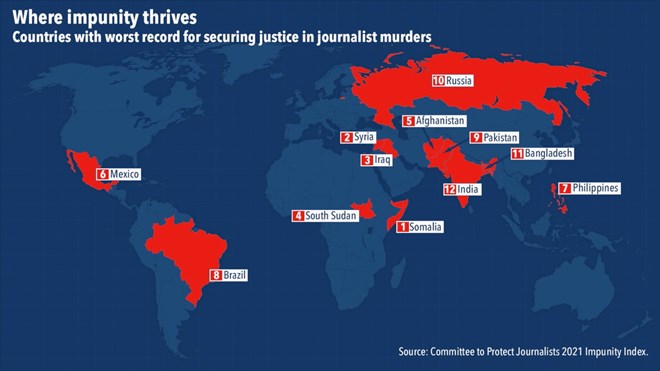
Thursday October 28, 2021
By Esha Sarai

A report released Thursday by the Committee to Protect Journalists reinforced what press freedom experts have stressed for years: The killers of journalists often walk free.
In the past decade, CPJ has recorded 278 slayings of journalists. In 81% of those cases, no one was ever convicted in connection to the crime.
"This sends a terrible message for journalism, because any government, any criminal gang that wants to silence a journalist, can do so for a few thousand dollars to hire an assassin," Robert Mahoney, CPJ's deputy executive director, told VOA.
This year's index shows the usual countries — Somalia, Syria and Iraq — topping the list of those least likely to hold the killers of journalists accountable. The worst five countries are all dealing with postwar political instability.
According to the report, in the war-torn country of Somalia over the past decade, out of an estimated 70 journalists who died violently of various causes, 25 killings were unsolved.
Danger in Afghanistan grows
Afghanistan ranks fifth on the list, with at least 17 unsolved killings of journalists over the past decade, including at least four journalists who worked for Radio Free Europe/Radio Liberty, a sister organization of VOA.
But the country has become increasingly more dangerous in the past year, the CPJ said, with journalists fleeing after the Taliban took control.
At least two of the journalists included in CPJ's data reported receiving threats from the Taliban before their deaths. And the Afghan Journalists Safety Committee, which has tracked attacks and assaults on media over a longer period than the CPJ report, said the Taliban is suspected in at least 27 killings.
Afghanistan has consistently ranked fifth on CPJ's impunity index, but the organization notes that hundreds of journalists fled the country in August and September.
"While the country's spot on the index did not change, the situation on the ground for reporters deteriorated dramatically in 2021 as the Taliban took control in mid-August amid the withdrawal of U.S. and coalition forces and the flight of President Ashraf Ghani," the report reads.
"Now that the structures for justice for investigation and prosecution have been substantially weakened, if not destroyed, it's very unlikely that any of those outstanding cases are going to receive justice," Mahoney said.
In recent months, journalists in Afghanistan and those who fled the country have said that many of their colleagues have gone missing.
"The whereabouts of more than 200 journalists and civil society activists is not known," Storai Karimi, a reporter for Pajhwok Afghan News who fled to Pakistan for her safety, told VOA in September.
"This shows that journalists are not safe," Karimi said.
Farida Nekzad, the director of the Center for the Protection of Afghan Women Journalists who fled to Canada for safety, told VOA this month that her colleagues have recounted horrifying tales of Taliban forces breaking into their offices and homes but that they are too scared to report the threats and disruptions.
"Nobody will bring up these issues, because they're afraid," she said.
"Because there is no guarantee (of safety), they think maybe if they talk about what happened the other night, 'tonight they will come and take us, and we will disappear,'" she said.
Journalists from USAGM networks including VOA are among those who have fled or are trying to evacuate from Afghanistan.
'Cancer on journalism'
Because those who threaten and kill journalists are seldom held accountable, fear and self-censorship among journalists has increased, according to Mahoney.
"Impunity is a cancer on journalism. It causes journalists to censor themselves, because they live in fear of their lives if they shine a light into dark places," he said. "As long as a killer of a journalist is at large, journalism in that country is in danger."
Since CPJ released its first yearly impunity index over a decade ago, the situation in many of the top-ranked countries hasn't appeared to have improved. But press freedom advocates say that continuing to pressure and monitor the countries who don't hold killers accountable is necessary.
"I actually think that there is value in naming these things as they are and putting them out there in a more public sphere," Almudena Bernabeu, an international attorney and director of the Guernica Centre for International Justice, told VOA.
People's Tribunal
Bernabeu was selected as the lead prosecutor in a new People's Tribunal at The Hague that will investigate the killings of journalists. The first hearing is scheduled for Nov. 2, the International Day to End Impunity for Crimes against Journalists.
The tribunal will not have powers to punish or sentence anyone, but those involved say the process of investigating the circumstances and suspects involved will benefit press freedom globally, even if government leaders are unlikely to appear in the court themselves.
"It's about embarrassment. There's a lot of power when you are naming publicly, out loud, a country that has been irresponsible or authorities that have been neglecting a particular investigation," Bernabeu said.
This embarrassment and public acknowledgment are key motivators behind the release of the impunity index.
"The impunity index sends the message that we will not forget our fallen colleagues," Mahoney said.
"We are committed to seek justice for those journalists who have been murdered in the pursuit of their profession," he said.